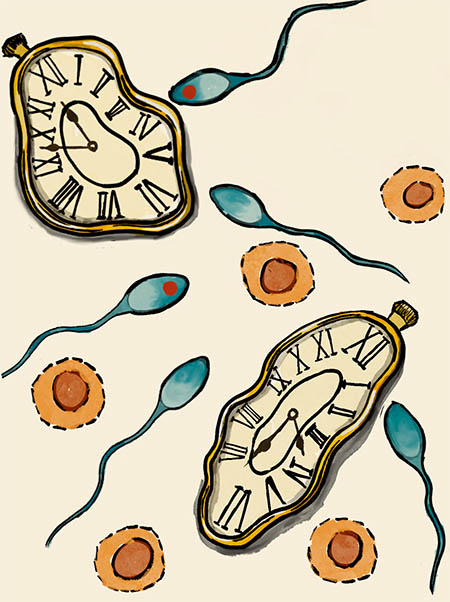Human Sperm Mutations that can Cause Disease in Children Identified
Researchers find that one in 15 men are likely to carry mutations that could adversely affect their offspring
Published Date
Article Content
Throughout development, life and the processes of aging, all human cells accumulate mutations, resulting in what is called mosaicism, a condition in which different cells in the same person have different DNA sequences or genetic makeup.
Mosaicism occurs in every human but is mostly unnoticeable. If abnormal cells begin to outnumber normal cells, however, diseases may result. When mosaicism occurs in human sperm or egg cells, the mutations can affect both the man or woman with the mutation and subsequent generations.
In a study publishing August 12, 2021 in Cell, researchers from the Rady Children’s Institute of Genomic Medicine and University of California San Diego School of Medicine describe a new method for observing and counting these mutations, and using this data to predict the likely impact of these mutations on future children.

All human cells, including sperm, accumulate mutations over time and through the processes of aging. Photo credit: Joseph Gleeson lab
Notably, they report that one in 15 men are likely to carry mutations in their sperm that could adversely affect their offspring.
Previous research suggested that older men have a higher risk of certain diseases in their children, such as autism spectrum disorder (ASD) and some forms of birth defects. In the latest study, researchers compared sperm from older men with younger men to ascertain any differences in mutations.
They found that detectable mutations did not differ in number, suggesting these mutations create a stable risk of disease in offspring. The findings also indicated that age-associated mutations appear most likely to arise in single sperm cells, which occur below current levels of detection.
“Our earlier studies told us that sperm mutations contribute to the cause of disorders, such as autism and epilepsy, but the implications in men without a family history of disease was completely unknown,” said senior author Joseph Gleeson, MD, Rady Professor of Neuroscience at UC San Diego School of Medicine and director of neuroscience research at the Rady Children’s Institute for Genomic Medicine.
Researchers sequenced sperm in multiple samples hundreds of times across their entire genomes to find mutations presenting only in a small percentage of cells, using state-of-the-art machine learning tools.
“We found that each ejaculate from a man shows an average of 30 mutations,” said co-first author Xiaoxu Yang, PhD, a postdoctoral scholar in Gleeson’s lab. “Almost all of these were found in serial sampling from a period of six to 12 months, whereas most of the mutations were completely absent from a saliva or blood sample.” The data, said Yang, indicates the mutations are restricted to sperm cells, and also validates their detection method.
“Surprisingly,” said co-first author Martin Breuss, PhD, assistant professor of pediatrics-clinical genetics and metabolism at the University of Colorado School of Medicine and a former postdoctoral scholar in the Gleeson lab, “the comparison between the old and young men showed few differences in mutations, telling us that these mutations probably arose when the father was an embryo, where the mutations could reside undetected until the man has children.”
Breuss said it also means that sperm cells are well-protected in a stem cell niche, which does a good job at maintaining stem cell populations and their relative contribution to each ejaculate.
“We think that these mutations contribute a substantial burden on human health,” said Gleeson, “potentially causing 15 percent of ASD cases, congenital heart disease and severe pediatric diseases. But we are hopeful that by identifying men at risk, future cases of disease can be avoided.”
Future research, said the authors, will focus on identifying the causes of the mutations arising in older men, and environmental exposures that might explain observed increases in mutations. The team is recruiting families where a child has a disease due to a new mutation, and where the father can donate a sperm sample to test for evidence of the mutation. For information on enrolling in the study please email contact@gleesonlab.org or visit gleesonlab.org.
Researchers are also working with infertility clinics to assess whether these mosaic mutations are passed to embryos, with the goal of ultimately preventing disease in children.
Co-authors include: Xin Xu, Danny Antaki, Kiely N James, Valentina Stanley, Laurel L Ball, Renee D George, Sara A Wirth, Beibei Cao, An Nguyen, Jennifer McEvoy-Venneri, Guoliang Chai, Shareef Nahas, Kraan Van Der Lucitia, Yan Ding and Jonathan Sebat, all at UC San Diego.
Funding for this research came, in part, from the National Institutes of Health (grants U01MH108898, R01NS083823) and the Simons Foundation Autism Research Initiative (SFARI 571583).
Disclosure: Martin W Breuss, Danny Antaki, Kiely N. James, Jonathan Sebat and Joseph G Gleeson are inventors on a patent (PCT/US2018/024878, WO2018183525A1) filed by UC, San Diego entitled "Methods for assessing risk of or diagnosing genetic defects by identifying de novo mutations or somatic mosaic variants in sperm or somatic tissues." Dr. Gleeson is a personal consultant for and receives income from Ionis Pharmaceuticals, Inc.
Share This:
You May Also Like
Stay in the Know
Keep up with all the latest from UC San Diego. Subscribe to the newsletter today.



